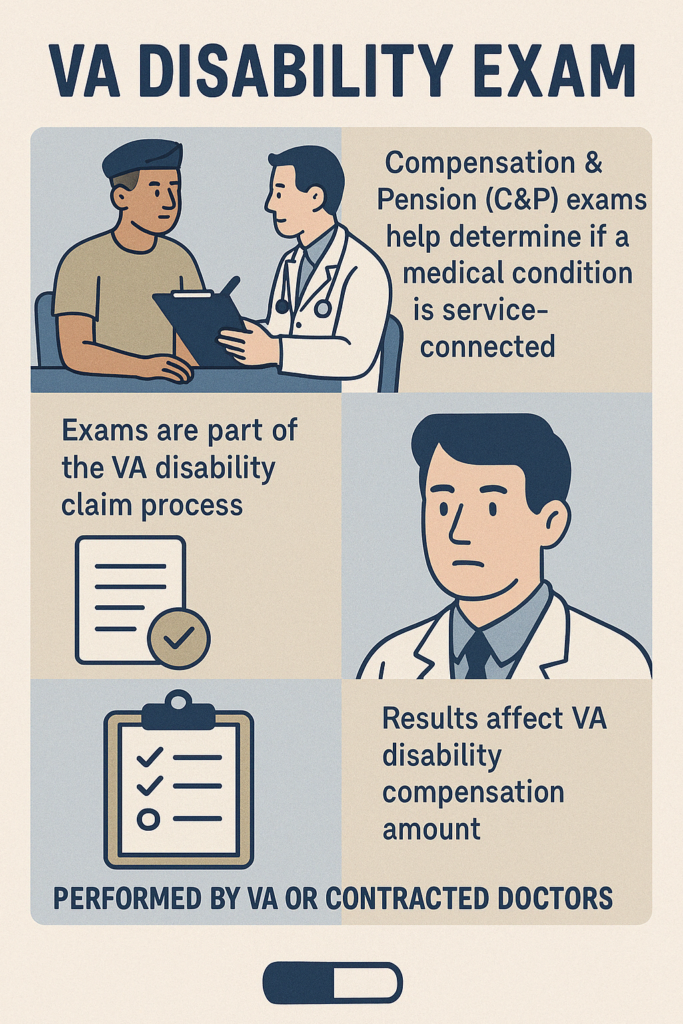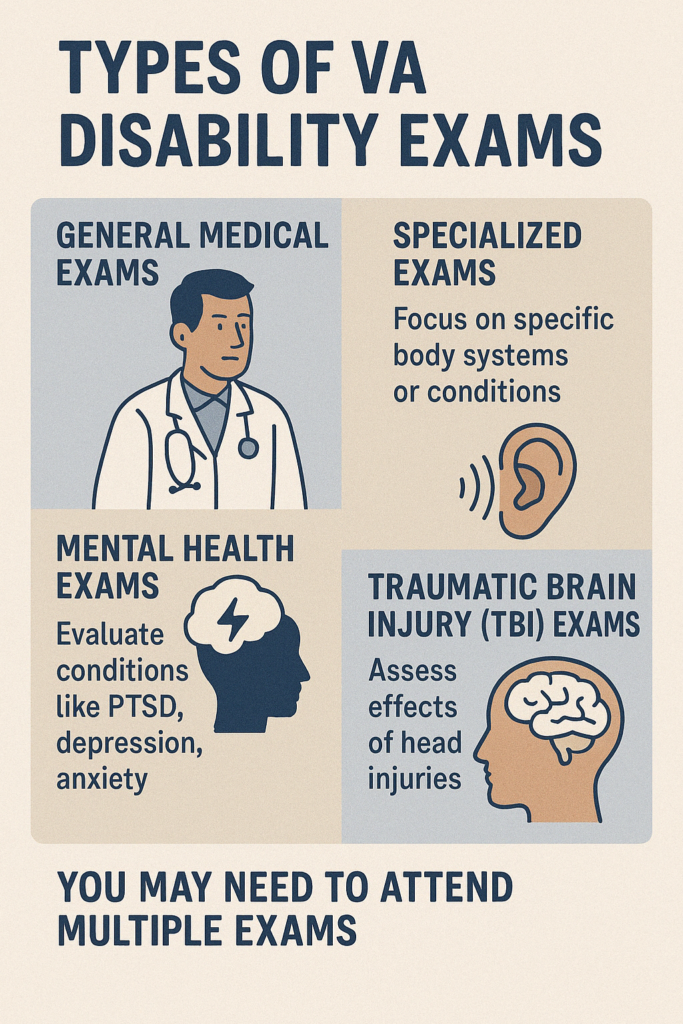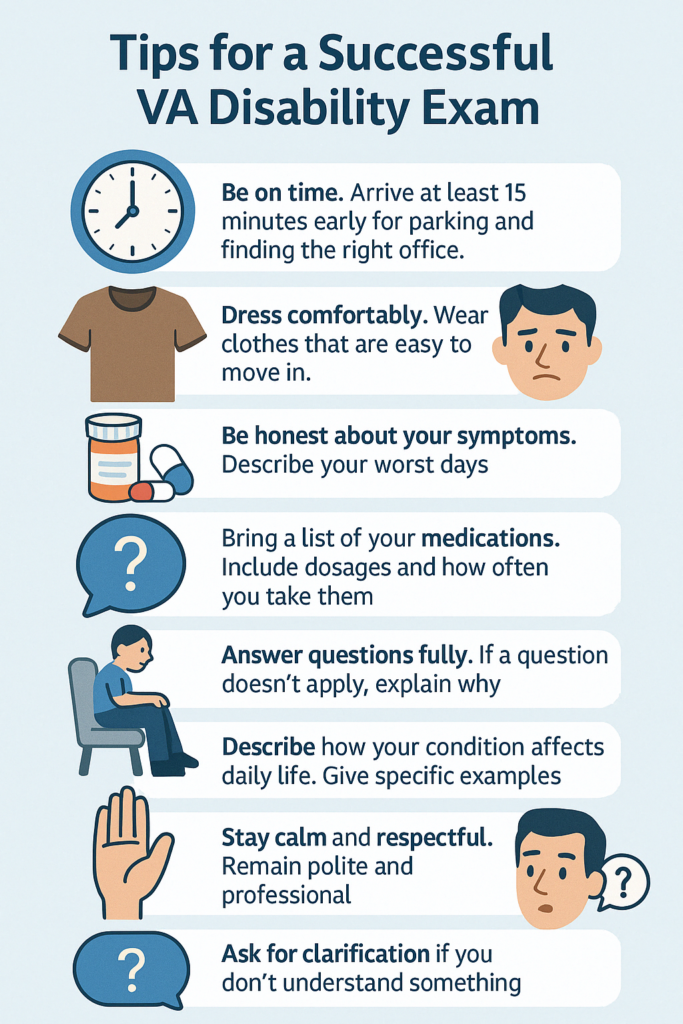VA disability exams, also known as Compensation and Pension (C&P) exams, are a crucial part of the VA disability claim process. These exams help determine if a veteran’s medical condition is related to their military service and how severe it is. The results of these exams play a big role in deciding if a veteran will receive VA disability benefits and how much. Knowing the best practices of these exams can help you make your claim process go more smoothly.

When you file a VA disability claim for VA disability benefits, the Department of Veterans Affairs may schedule you for one or more of these exams. The purpose is to gather more information about your condition and how it affects your daily life. It’s important to know that these exams are different from regular medical check-ups. They are specifically designed to evaluate your disability claim.
The exams are usually performed by VA doctors or contracted medical professionals. They will ask questions about your condition, review your medical history, and may perform physical or mental health evaluations. The exam results are then used by VA claim processors to make decisions about your VA disability compensation amount.
Preparing for Your VA Disability Exam
Getting ready for your VA disability claim exam can help ensure you present your case clearly and completely to Veterans Affairs. Here are some steps you can take to prepare:
- Gather all relevant medical records. This includes any treatment you’ve received for your condition, both from VA and non-VA healthcare providers. Having these records on hand can help the examiner understand your medical history better.
- Make a list of your symptoms. Write down how your condition affects your daily life, including any limitations on work or personal activities. Be specific about how often you experience symptoms and how severe they are.
- Bring a friend or family member with you. They can provide support and may be able to offer additional information about how your condition affects you.
- Be honest and thorough. Don’t try to exaggerate your symptoms, but don’t downplay them either. The goal is to give the examiner a clear and accurate picture of your condition.
Remember, the exam is your opportunity to explain how your condition impacts your life. Being prepared can help you make the most of this important step in the VA claim process.
What to Expect During the Exam
Knowing what to expect can help ease any anxiety you might have about your VA CP exam. Here’s a general idea of what might happen:
The exam usually starts with the examiner introducing themselves and explaining the purpose of the CP exam. They’ll likely review your claim file and medical records. Then, they’ll ask you questions about your condition, its symptoms, and how it affects your daily life.
Depending on your claimed condition, the exam might include physical tests or mental health evaluations. For physical conditions, the CP examiner might ask you to perform certain movements or actions to assess your limitations. For mental health conditions, you might be asked questions about your thoughts, feelings, and behaviors.
It’s important to answer all questions honestly and completely. If you don’t understand a question, ask for clarification. The examiner is there to gather information, not to provide treatment or make decisions about your claim.
The length of the exam can vary depending on the complexity of your condition. Some exams might take 15-20 minutes, while others could last an hour or more. After the exam, the CP examiner will write a report that will be used in deciding your VA disability rating, and therefore your VA disability compensation.
Types of VA Disability Exams

There are several types of VA disability exams, each designed to evaluate different kinds of conditions. Understanding which type of disability examination you’ll have can help you prepare better. Here are some common types:
- General Medical Exams: These cover a wide range of physical conditions. The examiner will review your overall health and may perform basic tests like checking your blood pressure or examining your joints.
- Specialized Exams: These focus on specific body systems or conditions. For example, there are specialized exams for hearing loss, vision problems, or respiratory issues.
- Mental Health Exams: These evaluate conditions like PTSD, depression, or anxiety. The examiner will ask about your symptoms, how they affect your life, and may use standardized questionnaires.
- Traumatic Brain Injury (TBI) Exams: These assess the effects of head injuries. They may include cognitive tests and questions about physical, emotional, and behavioral changes.
Remember, you might need to attend multiple exams if you’re claiming several conditions. Each exam is designed to gather specific information about your claimed disabilities.
After the VA Disability Exam
Once your VA disability claim exam is complete, you might wonder what happens next. Here’s what you can expect:
The CP examiner will write a detailed report based on their findings from your exam. This report becomes part of your claim file. The VA will use this report, along with other evidence in your file, to make a decision on your claim.
It’s important to know that you won’t get the results of your exam directly from the examiner. The exam report is sent to the VA regional office handling your claim. If you want to see the report, you can request a copy of your claims file from the VA.
After your exam, if you remember any important information you forgot to mention, you can submit a written statement to the VA. This statement should be included in your claim file along with the exam report.
The time it takes to get a decision after your exam can vary. It depends on factors like the complexity of your claim and the current workload at the VA. While waiting, you can check the status of your claim online through the VA’s eBenefits portal or by contacting your local VA office.
Common Concerns About VA Disability Exams
Many veterans have questions and concerns about VA disability exams. Let’s address some of the most common ones:
- “What if I can’t make it to my scheduled exam?” If you can’t attend your exam, contact the VA as soon as possible to reschedule. Missing an exam without good reason can result in your claim being denied.
- “Can I bring my own medical evidence to the exam?” Yes, you can bring any relevant medical records or written statements from your doctors. However, the examiner may not have time to review them during the exam.
- “What if I disagree with the exam results?” If you disagree with the VA’s decision based on your exam, you have the right to appeal. You can also request a copy of the exam report to review.
- “Will the exam be done by my regular VA doctor?” Usually not. VA disability exams are typically conducted by different healthcare providers who are trained specifically for these evaluations.
- “How often will I need to have these exams?” This varies. Some veterans may need follow-up exams to assess changes in their condition, especially if they’re seeking an increase in their disability rating.
Remember, it’s okay to ask questions during the exam process if you’re unsure about anything. The goal is to ensure that your condition is accurately evaluated.
Tips for a Successful VA Disability Exam

To help you get the most out of your VA disability exam, here are some helpful tips for a smooth exam process:
- Be on time. Arrive at least 15 minutes early to allow for parking and finding the right office.
- Dress comfortably. Wear clothes that are easy to move in, especially if you’re being examined for a physical condition.
- Be honest about your symptoms. Don’t exaggerate, but don’t minimize your problems either. Describe your worst days, not just how you feel on a good day.
- Bring a list of your medications. Include dosages and how often you take them.
- Answer questions fully. If a question doesn’t seem to apply to you, explain why instead of just saying “no.”
- Describe how your condition affects your daily life. Give specific examples of activities you can no longer do or struggle with because of your disability.
- Stay calm and respectful. Even if you disagree with something the examiner says, remain polite and professional.
- Ask for clarification if you don’t understand something. It’s important that you comprehend all questions and instructions.
By following these tips, you can help ensure that your VA disability rating accurately reflects the nature and severity of your condition.
The Importance of VA Disability Exams in the Claims Process
VA disability exams play a crucial role in the claims process. They provide objective medical evidence that the VA uses to make decisions about your benefits. Here’s why these exams are so important:
- They help establish service connection. The exam can provide evidence linking your current condition to your military service.
- They determine the severity of your condition. This is crucial for deciding your disability rating, which affects the amount of compensation you receive.
- They offer a current assessment of your condition. This is especially important if your symptoms have changed since you first filed your claim.
- They provide a standardized evaluation. This helps ensure that all veterans are assessed fairly and consistently.
- They can identify secondary conditions. Sometimes, the exam may reveal additional health issues related to your primary condition.
Understanding the significance of these exams can help you approach them with the seriousness they deserve. Remember, the exam is your opportunity to have your condition formally evaluated for your claim.
Your Exam Can Help Support Your Claim For VA Disability Benefits
While the exam is important, it’s not the only factor in deciding your claim. The VA will also consider your service records, medical history, and any other evidence you provide. However, a thorough and accurate exam can greatly support your claim for VA disability benefits.
Jumpstart your journey to benefits today by taking our free medical evidence screening at AllVeteran.com. We’re here to help!
 AllVeteran.com Advisors
AllVeteran.com Advisors
With expertise spanning local, state, and federal benefit programs, our team is dedicated to guiding individuals towards the perfect program tailored to their unique circumstances.


















